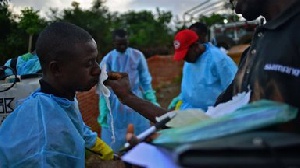- Home - News
- TWI News | TV
- Polls
- Year In Review
- News Archive
- Crime & Punishment
- Politics
- Regional
- Editorial
- Health
- Ghanaians Abroad
- Tabloid
- Africa
- Religion
- Election 2020
- Coronavirus
- News Videos | TV
- Photo Archives
- News Headlines
- Press Release
Health News of Friday, 16 January 2015
Source: BBC
Ebola crisis: New cases declining in West Africa
New Ebola cases in the three West African countries worst affected by the deadly outbreak of the virus are declining, weekly UN figures show.
Sierra Leone and Guinea both recorded the lowest weekly total of confirmed Ebola cases since August.
Liberia, which reported no new cases on two days last week, had its lowest weekly total since June.
The death toll from the world's worst Ebola outbreak has reached 8,429 with 21,296 cases so far.
According to the latest World Health Organization (WHO) report, Guinea, Liberia and Sierra Leone now all have sufficient capacity to bury all the people known to have died from Ebola.
But it said under-reporting of deaths meant that not all burials were being done safely.
Schools to open While cases were decreasing in Sierra Leone, it remained the worst-affected country, with western areas still reporting the most new transmissions, the WHO said.
Last week, there were 59 new reported cases in the capital, Freetown.
The spirit of Freetown seems to be back with residents in the capital celebrating, albeit quietly, the low Ebola infection figures. For over a week the reported daily infections have been in single figures and on Tuesday there were only two deaths.
Like Premier League football fans, people converge at internet cafes and street corners to follow the daily updates. The usually grim faces are now grinning. The ubiquitous blaring of ambulance sirens has also reduced considerably. In fact, the national daily infection rate is around 20 - in November it was 60.
"Ebola is in trouble," says Ahmed Turay, a teenager who has not been to classes since July. "I look forward to returning to school," he says, smiling broadly.
The eastern district of Kailahun, which first recorded Ebola eight months ago, has had no cases for 35 days and the other former hotspot of Kenema has had only four cases since November. But the authorities are warning all to exercise caution, insisting Ebola is still here.
Meanwhile, in Guinea it has been announced that schools and universities are to reopen next Monday after a five-month closure because of Ebola.
The BBC's Alhassan Sillah in Guinea says the authorities there are also stepping up Ebola information campaigns as in some areas people are still suspicious of official attempts to fight the disease.
Over the weekend, two policemen were killed by villagers who feared they had brought Ebola to the western district of Forecariah.
Earlier this month, the outgoing head of the UN team fighting Ebola, Anthony Banbury, said he believed cases of the virus would be brought down to zero by the end of 2015.










